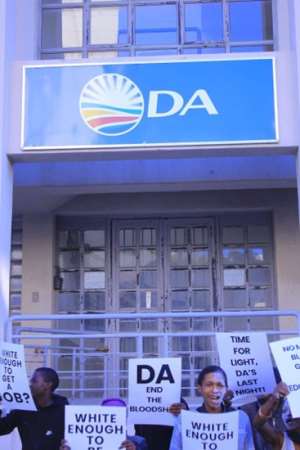
In a turn of events that suggests a tide of public opinion turning against the Democratic Alliance (DA), the bustling streets of eThekwini became a gallery of dissent. Posters featuring DA leaders, intended to bolster the party’s image, were repurposed with critical annotations that cast a shadow over the message of the RescueSA tour. In an act of visual defiance, the campaign posters were met with a counter-campaign as people in the crowd at a rally led by John Steenhuisen held up images portraying him as a clown. This poignant display of satire underscored a sentiment that the promises of the DA were out of step with the realities of many South Africans. The hashtag #rescueDumbAlliance, which surfaced at these gatherings, became a trending emblem of the public's disenchantment, striking at the heart of the DA's campaign narrative.
The scene in Kwazulu Natal sharply contrasts with the struggles experienced in Cape Town, the home base of the DA, where the everyday realities for many are anything but a political showcase. Cape Town, marred by its own set of challenges including water shortages, high crime rates, and housing crises, stands as a testament to the unresolved issues under the DA's watch. These enduring problems in one of the world's most beautiful yet divided cities are a stark reminder that effective governance is measured by the wellbeing of its citizens, not the gloss of its campaigns.

Amidst this landscape of dissatisfaction, a raw and human element emerged from the heart of Cape Town. Homeless individuals, often the unseen victims of urban policy failures, staged a protest outside the DA's offices. Their painted faces and placards weren’t mere props but embodied the anguish and neglect felt by those on the fringes of society. Their slogans posed a haunting question to the DA: "Are we white enough to get water? Are we white enough to get protection?" This protest, ending in detainment, laid bare the depth of division and discontent at the intersection of race and social services in the city.
These collective narratives from the critical posters of eThekwini to the cries for equitable resources in Cape Town draw a complex and rather grim portrait of the DA's standing among various segments of the population. As the hashtag #rescueDumbAlliance captures the digital zeitgeist, it reflects a broader skepticism about the party's ability to address the critical issues facing South Africans. The DA finds itself at a critical juncture, where the party's self-praised accomplishments are met with a counter-narrative of protest and outcry for genuine transformation.

In conclusion, while the DA continues to project an image of stability and progress, the voices of those within the very communities it represents suggest a different reality, a reality where the shine of political marketing gives way to the pressing needs of a diverse and often divided electorate. The #rescueDumbAlliance hashtag is not just a catchy political barb but a summation of the party's current predicament, highlighting a disconnect between the party's leadership and the lived experiences of its citizenry.




 No constituency left without representation in Parliament — Afenyo Markin
No constituency left without representation in Parliament — Afenyo Markin
 Parliament approves $150million for Accra flood-proofing project
Parliament approves $150million for Accra flood-proofing project
 One-sided Parliament approves ministerial nominees as minority walks out
One-sided Parliament approves ministerial nominees as minority walks out
 It's 'impossible' to rig elections in Ghana - EC to NDC
It's 'impossible' to rig elections in Ghana - EC to NDC
 Bosomtwe: Violent rainstorm kills girl at Jarchie
Bosomtwe: Violent rainstorm kills girl at Jarchie
 Mahama takes bribe in every deal — Chairman Wontumi
Mahama takes bribe in every deal — Chairman Wontumi
 Late John Kumah goes home tomorrow
Late John Kumah goes home tomorrow
 Akufo-Addo's corrupt nature contributing to Special Prosecutor's hunt from offic...
Akufo-Addo's corrupt nature contributing to Special Prosecutor's hunt from offic...
 Watch how a ‘slay queen’ repented after having an encounter with Alpha Hour
Watch how a ‘slay queen’ repented after having an encounter with Alpha Hour
 Kennedy Agyapong and I are blood relatives — Bishop Obinim
Kennedy Agyapong and I are blood relatives — Bishop Obinim
